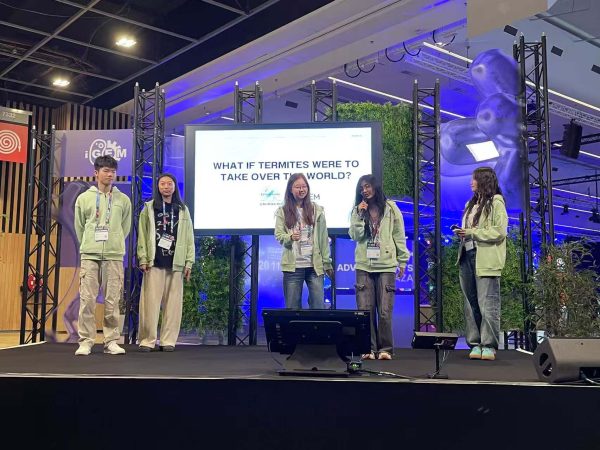News Express: UM undergraduate team wins gold medal at iGEM
新聞快訊:澳大本科生團隊奪iGEM金獎

澳大團隊演講
The UM team gives a presentation
澳大本科生團隊奪iGEM金獎
澳門大學健康科學學院本科生研究團隊參加於巴黎舉行的“2025國際基因工程機器大賽”(iGEM),憑藉針對白蟻防治的創新合成生物學項目勇奪大賽金獎。這是澳大團隊連續第七年於該項賽事獲獎,累計金獎數目達四項。
是次大賽吸引來自超過50個國家及地區、400多支隊伍參與,當中包括麻省理工學院、哈佛大學、清華大學等世界知名高校的團隊。澳大團隊由健康科學學院13名本科生組成,在學院教授黃值富、副教授李子安和劉子銘、助理教授陳奇涵和李俊樂的共同指導下,針對日益嚴峻的白蟻問題,提出一項兼具高效性、環保性及可持續性的創新防治方案。
白蟻以植物纖維素為食,對木製建築構成嚴重威脅,在全球暖化背景下更為加劇。現行的白蟻防治方法雖具一定成效,惟仍面臨環境污染、成本高昂等挑戰。澳大團隊運用合成生物學技術,利用改造後的大腸桿菌生產天然毒素與引誘劑,並結合增效劑製成高效且環保的殺蟲劑配方。當中,天然毒素包括植物胰蛋白酶抑制劑(EcTI)與蜂毒肽(Melittin),分別干擾白蟻的消化系統與腸道微生物;引誘劑對苯二酚則刺激白蟻吞食行為,提升毒餌攝入率。同時,澳大團隊設計了兩種應用模式——地下固體毒餌站與液體注射器,分別用於長期根除與即時處理,並透過數學建模預測餌料放置策略與毒素傳播趨勢,提升防治效率。
澳大團隊善用課餘時間積極投入項目設計與實驗工作,並前往多地進行實地考察與學習,深入了解白蟻生態與防治技術的實際應用。透過與業界及學術界的交流,團隊持續優化實驗設計,並掌握野外誘捕技術的操作要點,進一步提升了項目的可行性與應用潛力。團隊亦在相關專家的指導下,明確技術創新方向,使項目內容更具深度與科學性。團隊隊長、健康科學學院大三學生王穎表示,項目過程中雖要克服眾多前所未有的挑戰,但收穫豐碩,不僅提升了專業知識,更鍛鍊了溝通協作等軟實力。
iGEM由麻省理工學院於2003年發起,旨在鼓勵參賽者運用合成生物學知識解決人類面臨的實際問題,已成為全球生物科技領域最具影響力的學生競賽之一。
欲瀏覽官網版可登入以下連結:
https://www.um.edu.mo/zh-hant/news-and-press-releases/press-release/detail/62532/
UM undergraduate team wins gold medal at iGEM
A team of undergraduate students from the Faculty of Health Sciences (FHS) at the University of Macau (UM) has won a gold medal at the 2025 International Genetically Engineered Machine (iGEM) Competition held in Paris. Their award-winning project focuses on an innovative synthetic biology solution for termite control. This is the seventh consecutive year that UM has won an award at iGEM, bringing the total number of gold medals to four.
This year’s competition attracted over 400 teams from more than 50 countries and regions, including teams from renowned institutions such as the Massachusetts Institute of Technology (MIT), Harvard University, and Tsinghua University. The UM team comprised 13 undergraduate students in FHS and was guided by FHS Professor Garry Wong, Associate Professors Leo Lee Tsz On and Liu Tzu-Ming, as well as Assistant Professors Chen Qihan and Lei Chon Lok. In response to the growing issue of termite infestation, the team proposed an innovative control solution that is highly effective, eco-friendly, and sustainable.
Termites feed on cellulose and pose a threat to wooden structures, and the issue of termite infestation is exacerbated by global warming. Although existing termite control methods are effective, they are limited by issues such as environmental pollution and high costs. The UM team used synthetic biology techniques to engineer E. coli to produce natural toxins and attractants. They then combined these with enhancers to formulate a highly effective, eco-friendly termite pesticide. The natural toxins include EcTI, a plant-derived trypsin inhibitor that disrupts termite digestion, and melittin, a peptide found in bee venom that damages the termite’s gut microbes. Meanwhile, the attractant hydroquinone stimulates termite feeding behaviour to increase bait intake. The team also developed two application models: an underground solid bait station for long-term colony eradication, and a liquid injector for immediate treatment. Mathematical models were used to optimise bait placement strategies and simulate toxin transmission within termite colonies, thereby enhancing control efficiency.
The UM team members dedicated their spare time to project design and experimentation, as well as conducting field visits in various places to gain a deeper understanding of termite ecology and the application of control measures. By exchanging ideas with industry practitioners and scholars, the team refined their experimental design and gained practical insights into field trapping techniques, thereby enhancing the project’s feasibility and potential applications. With guidance from experts, the team clarified the innovative aspects of their solution, making it more scientifically rigorous. Team leader Wang Ying, a third-year student in FHS, said that although the process was filled with many unprecedented challenges, the rewards were plentiful. They had not only enhanced their professional knowledge but also developed soft skills such as communication and teamwork.
Founded by MIT in 2003, iGEM encourages participants to use synthetic biology to address real-world problems. It has since become one of the world’s most prestigious student competitions in biotechnology.
To read the news on UM’s official website, please visit the following link:
https://www.um.edu.mo/news-and-press-releases/press-release/detail/62532/